- Home
- Naguib Mahfouz
Akhenaten: Dweller in Truth Page 10
Akhenaten: Dweller in Truth Read online
Page 10
The minister was silent for a long time. Then he mumbled in deep sadness, “This is a story of innocence, of deception, and infinite grief.”
Bento
Bento was Akhenaten's personal physician. Indeed, when I met him, he still occupied the position of personal physician of the pharaoh in Tutankhamun's palace. Bento was sixty years old, with a noble bearing and marks of Nubian descent. When I visited him in his beautiful palace at the center of Thebes, I found him to be a man of serene nature and soft voice, yet extremely energetic. His clothes were exquisitely tasteful. Gathering his memories, Bento began.
Today, Akhenaten is known only as “the heretic.” But despite all that was said about him, my heart still fills with love at the mention of his name. What a life he created for himself! Did Akhenaten really live among us? Did he really devote his life to love? Why, then, all the malice and hatred that was left behind? Whenever I think of him I remember how, when he was a young boy, he aroused the concern of all those who knew him. The Great Queen Tiye would often ask me, “Why is Akhenaten so frail, Bento?”
I remember my confusion in trying to answer. Akhenaten had no particular ailment. But he was thin and feeble, and, unlike his brother Tuthmosis, he was prey to every malady that came his way. He did not like sport, nor was he keen on maintaining a good diet. I often prayed to Thoth, the god of science, asking him to advise me on Akhenaten. Yet all my attempts were to no avail. Thoth's amulets had no effect on him, and herbs blessed by Isis did nothing to help his sickly body. I became extremely worried when, during the khamsin winds, he fell ill and his brother soon contracted the same disease. They were both confined to one room when the queen said to me, “Look, Bento, their faces are so yellow, and their stomachs feel like stone. Neither of them has relieved himself in days.”
I examined them carefully. “They have a temperature and their stomachs are bloated. Give them a drink that will ease their bowels. Then mix some sweet, fermented malt water with flour and leave it to infuse overnight. Let that be their only food for four days.”
Before four days had passed the strong Tuthmosis died and the feeble brother was spared. Akhenaten wandered about the palace, grieving, looking for his brother.
“You left my brother to die,” he protested when he saw me. Then he looked at his father and continued, “When I become pharaoh, I will kill death.”
“Could Tuthmosis come back for just one day?” he asked me once.
“Pray to the gods who spared your soul, Akhenaten, for there is no return from death, and we shall all die in time,” I replied.
“Why?” he insisted.
“Akhenaten,” I said softly, “let us hear that song you sang with your brother.”
Our loved ones left us
Only words to remember.
O saddened hearts,
Live not in grief,
For Osiris shall hear no pleas,
Nor will wailing
Bring back the dead.
For a long time sadness was his only companion, so much so that I thought he outdid even his mother in mourning his brother. As I was treating him once, he asked, “Why all this effort if we are going to die anyhow?” I smiled and continued my work. He said, “You smile as though you were immortal.”
I replied, to avoid his pestering, “Ask your tutor Ay.”
“Ay doesn't know any more than you,” he said scornfully.
The maturity of his mind, in one so young and delicate, made a deep impression on me. I followed his spiritual adventures keenly, and was filled with admiration. He had astounding qualities that one could not fathom; he had the power to defy any force that challenged him. Despite his physical weakness, he had exceptional perseverance. He barely slept. Instead, he prayed constantly like a priest, and read like a sage. He never wearied of asking questions or debating. What, I wondered, would destiny hold in store for him if one day he sat on the throne of his forefathers? His father, King Amenhotep III, was so concerned that he once said, “The boy is worthy of anything but the throne.”
One day I noticed him glaring angrily at his father. “You understand matters beyond your age,” I said, “but you still do not realize your father's greatness.”
He replied irritably, “I cannot bear the way he gobbles his food.”
He was repulsed by those who were driven by carnal desires. I used to believe a healthy body was essential for a healthy soul, but he proved that the opposite was also true. I learned from him that the soul may lend a weak body power beyond its physical capabilities.
“You pay so much attention to the body, as if it were everything, when in fact the real strength lies in the soul,” he said. “The body is a poor frame, sordid and amoral. It can fail and collapse with only an insect's sting. But the soul is immortal.” Then he cried out, as if he had completely forgotten my existence, “I do not know what I want, but I know that I am full of desire. Oh how dreary is the long night!”
He would sit silently in the darkness awaiting the sunrise, and when the light came he would be glowing with happiness. Until one day he heard the voice of the One God with the first rays of sunlight. I realized then that Akhenaten was no gentle spring breeze, but a winter storm. Thebes knew no peace thereafter.
The king and queen summoned me. “What is the meaning of that voice he heard, Bento?” Tiye asked.
I was bewildered. “Perhaps the sage Ay is more suited to answer your question, my Queen.”
“The queen asked you in your capacity as a doctor,” the king said severely.
“I know no mind as sound as his, Your Majesty,” I replied sincerely.
“Is he mocking us then?”
“He is the most earnest man I know.”
“So you have no explanation for it.”
“That is the truth, Your Majesty.”
“Do you think his mind is sound?” he asked with a scowl.
“Yes, Your Majesty.”
“Could it be the voice of some evil force?”
“Decipher his words, for only they bear the answer to your question.”
He cried angrily, “The answer is in the storms that will hit us when the priests learn of his absurdity.”
When Akhenaten married Nefertiti, everyone hoped that in marriage his religious ardor would be restrained, and that he would begin to have a more realistic vision. But the wife, too, became a priestess. Together, they walked the path of the One and Only. No power on earth could stop them. Amenhotep III died and Akhenaten, bearing the message of the One Creator, succeeded him. We knew that in his reign something of grave significance was bound to happen; we were frightened to predict what it might be. Like the others, I was given the choice of either adopting his faith or living my life however I wished away from his palace. I did not hesitate and declared my faith in his God. The thought of being away from him was unbearable. Besides, I did love his God and secretly considered him the master of all gods. But I also kept my old faith in the other deities, especially Thoth, the god of science, whose talismans I used to treat people's maladies. Then there was the new city, Akhetaten, the marvelous city of the One God. We moved to it all together, an assembly of joyful people singing blissfully. The king was entranced, his face beaming with ecstasy.
“Here we are, O Mighty God, humble and transient in your pure city. O Great One, we enter your home, which has never known any god but you.”
At first we were so happy that we wished we were created immortal to live forever in that paradise. Every morning I compared what I heard in the temple of the One God to the liturgy of the old gods and the rituals of the Book of the Dead. I became certain beyond doubt that a stream of divine light was filling us with pure happiness. The first winds of trouble came with the death of the beloved princess Meketaten.
“Bento, save her. She is the love of my life,” Akhenaten pleaded.
When the beautiful princess passed away, the king and queen wept a flood of tears. He blamed his God until Meri-Ra said, “Do not anger God with your tears.”
Upon hearing the high priest, Akhenaten's wailing grew louder. No one knew if it was out of grief or guilt. Perhaps both.
“It is the sorcery of the priests of Amun,” Nefertiti cried. She repeated the same words every time she bore a daughter and the chance of a male heir was lost once more. Akhenaten shared her pain.
“Bento,” he asked, “can you help us bear a son?”
“I try my best, Your Majesty.”
“Do you believe in the sorcery of the priests?”
“We certainly should not underestimate it,” I replied reluctantly.
He meditated for a moment. “God will persevere, and his joy will fill the universe. But we, his humble creation, shall never be rid of our little sorrows,” he said mournfully. Because of his faith he was always able to elevate himself from grief to the summit of the holy truth where the brilliant light of God inundated his soul.
When the tension grew inside Egypt and on its borders, the high priest of Amun sent me a secret messenger.
“Can I trust you with saving the country from the dreadful fate that looms over it?” he asked, after reminding me of my vow in the temple of Amun.
I realized instantly that the high priest wanted me to use my role as the king's physician to kill him. I replied, “My profession does not condone treachery.”
I met with Maho, the chief of police, and asked him to step up security, particularly among the cooks in the palace.
Bento was silent for a while, seeking some rest from these wearisome memories. I remembered some of the conflicting reports I had heard about Akhenaten's sexu ality, but doubted that Bento would allude to it. Since I was very curious, I had to ask. “Akhenaten's body and features had the attributes of both male and female,” he said. “But, as a man, he was capable of loving and procreating.” Then my lips trembled with a pressing question. After a moment of hesitation I mustered up all my courage and asked, “Have you heard what they say about his relationship with his mother?” Bento scowled and said, “Of course I have, just like you. But I always dismissed it as malicious fabrication.” He stopped for a moment, looking increasingly troubled, then continued, “The fact is that Akhenaten was a very special being, far too good for any of us to understand. He was a visionary, promising a paradise irreconcilable with human nature. He confronted people with their mediocrity and provoked their deepest fears. So they pounced on him with animal anger and desperation.”
Encouraged by his openness, I continued, “What do you think of Nefertiti?”
“A great queen who has earned her greatness.”
“And how do you explain her desertion of Akhenaten?”
“I have only one explanation. She could not endure the blows that poured down on them; she felt helpless and took flight.” Then he continued.
The tragedy came to a terrible end when Akhenaten's men decided to abandon him. I asked Haremhab to let me stay with him as his physician. He told me that the priests would send their own physician to tend him. But he allowed me to examine him for the last time before I left. I went to the palace at once. It was empty apart from him and a few slaves and guards that the priests had appointed.
I found him in his usual solitude, praying, singing gently:
Lord of the beautiful, O Beautiful One,
With your love hearts beat
And birds trill.
You dwell within me, O Lord.
No other has known you
But your son,
Akhenaten.
When he finished his prayer, he looked at me and smiled. I looked away to hide the tears in my eyes.
“How were you able to come, Bento?” he asked.
“Haremhab gave me permission to examine you before I left.”
“I am in excellent health,” he said calmly.
“All the loyal ones were forced to leave,” I said, my voice tremulous with feeling.
“I know who was forced and who chose to leave.” The smile never left his face.
I bowed down and kissed his hand. “It pains me that you must remain alone.”
“I am not alone. Have faith, Bento,” he said calmly. Then he continued with an invigorating determination, “They think that my God and I are defeated. But he never betrays nor does he accept defeat.”
I cried so much that when I left the palace my eyes were like firebrands. I was certain that the physician they sent him would kill the most noble soul that has ever inhabited a human body. Since the time I left Akhetaten, I have been immersed in inescapable loneliness.
Nefertiti
I was allowed to enter Akhetaten only with special permission from General Haremhab. There were security checks at short intervals all along the bank of the Nile. A soldier escorted me across the northern quarter of the city from the harbor to the palace of the imprisoned queen. I was barraged by a host of emotions that left me stranded between sadness and wonder. The once glorious streets of Akhetaten had disappeared beneath heaps of dust and the dried leaves of withered trees. The grand doors of the palaces were closed like eyelids on tearful eyes. The palaces were collapsed, the fences fallen. The gardens had lost their colors and were left with the remains of trees shriveled like mummies. A heavy silence covered the city. In the center were the ruins of the temple of the One and Only God, where once the sweetest and holiest hymns were sung.
It was early afternoon when I reached the far end of the northern quarter. The queen's palace towered in the distance, set in a lush and colorful garden. My heart pounded when I glimpsed the only open window in the palace. It was the middle of autumn and the Nile was still in flood. Its mud-red water had filled the palace lake. My heart beat faster as I approached the end of my journey, as though the entire purpose of my quest was to meet this woman in her solitude.
I was ushered into a small, elegant room. The walls were inscribed with holy texts. In the center of the room there was an ebony chair with golden arms and legs, each sculpted in the form of a lion.
Finally I saw her, a vision, coming toward me gracefully in a white, flowing dress. She was elegant and beautiful. Her back was unbowed by forty years of grief and misfortune. I waited until she was settled in her chair, then she gestured to me and I sat before her. The beauty of her serene eyes was overcast by a shadow of weariness. She praised my father, then asked me bitterly, “And how do you find the city of light?”
I realized that I had been staring at her, captivated by her beauty. Abashed, I lowered my gaze, and remained silent.
“You must have heard a lot of tales about Akhenaten and me,” she said. “Now you can hear the whole truth.”
I grew up with a passion for true knowledge that was nurtured by the learnedness of my father, Ay. I lost my real mother when I was only one year old. But I did not feel that loss, for in Tey I found a compassionate, loving mother, and not merely a stepmother. She gave me a splendid, happy childhood. Even after she had my sister Mutnedjmet, her feelings toward me did not change. She was a wise woman. At first, Mutnedjmet and I were loving sisters. Because I was better at most things than Mutnedjmet, she became jealous and built up a fair share of resentment. But that only became evident much later. Tey, however, remained impartial, at least on the surface. I was quite grateful, and when the time came for me to reward her I appointed her the queen's matron and gave her the status of princess. One day, my father returned home with a holy man, one of those who are endowed with the gift of foretelling the future. He read both our fortunes, my sister's and mine.
“These girls shall sit on the throne of Egypt,” he said.
“Both of them?” said my father, astounded.
“The two of them,” the man assured him.
For some time we faltered between our faith in the holy man and the peculiarity of his prophecy.
“Perhaps one of us will be first and the other will be her successor,” I laughed.
For some mysterious reason Tey was not pleased with what I said. “Shall we forget about this prophecy and leave the future to the gods?” she
said sharply.
We tried to forget. But every so often the prophecy seemed to cast its shadow upon us, until things began to take an unexpected course and it was fulfilled before our very eyes. The first time I heard of Akhenaten was through my father, when he was appointed tutor to the crown prince. Father used to speak of Akhenaten's wisdom and maturity during our family gatherings.
“Akhenaten is an unusual person,” he once said. “He criticizes the priests and the deities and no longer believes in any god but Aten.”
Unlike my mother and sister, I was rather intrigued and drawn to what I heard. For I, too, loved Aten and was awed by his domain that comprised both heaven and earth, while other deities abided only in the darkness of the temples.
“The prince is right, Father,” I replied innocently.
My mother and sister were not pleased with my remark. Father said with a smile, “We are preparing you to be a wife, Nefertiti, not a priestess.”
I cannot deny my love for motherhood and other earthly pleasures, but the truth is, I was also born to be a priestess. Eventually my father told us the news of the new god, the Sole Creator. There was an uproar and the prince was the subject of stinging talk.

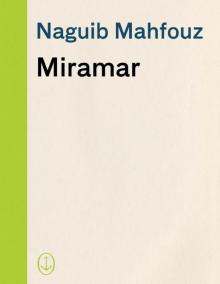 Miramar
Miramar The Mummy Awakens
The Mummy Awakens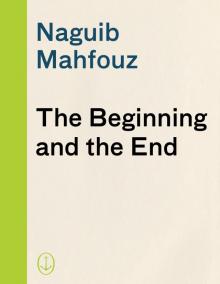 The Beginning and the End
The Beginning and the End Respected Sir, Wedding Song, the Search
Respected Sir, Wedding Song, the Search The Mirage
The Mirage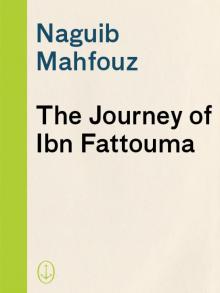 Novels by Naguib Mahfouz
Novels by Naguib Mahfouz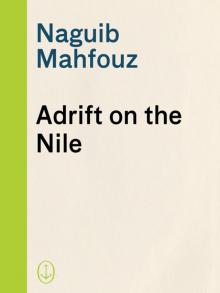 Adrift on the Nile
Adrift on the Nile Karnak Café
Karnak Café Heart of the Night
Heart of the Night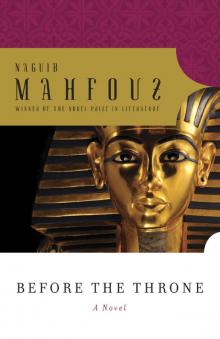 Before the Throne
Before the Throne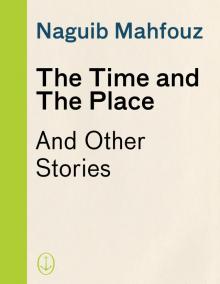 The Time and the Place: And Other Stories
The Time and the Place: And Other Stories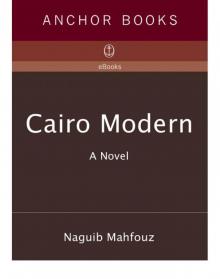 Cairo Modern
Cairo Modern Arabian Nights and Days
Arabian Nights and Days The Day the Leader Was Killed
The Day the Leader Was Killed Morning and Evening Talk
Morning and Evening Talk Three Novels of Ancient Egypt Khufu's Wisdom
Three Novels of Ancient Egypt Khufu's Wisdom Akhenaten: Dweller in Truth
Akhenaten: Dweller in Truth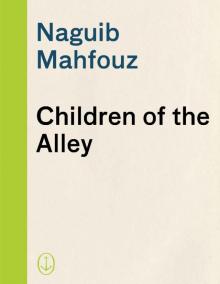 Children of the Alley
Children of the Alley Voices From the Other World
Voices From the Other World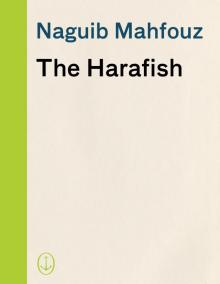 The Harafish
The Harafish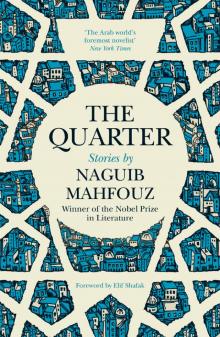 The Quarter
The Quarter The Seventh Heaven: Supernatural Tales
The Seventh Heaven: Supernatural Tales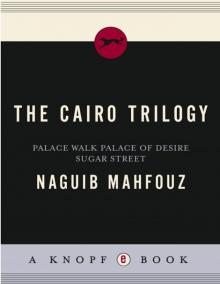 The Cairo Trilogy: Palace Walk, Palace of Desire, Sugar Street
The Cairo Trilogy: Palace Walk, Palace of Desire, Sugar Street Khan Al-Khalili
Khan Al-Khalili Three Novels of Ancient Egypt Khufu's Wisdom, Rhadopis of Nubia, Thebes at War
Three Novels of Ancient Egypt Khufu's Wisdom, Rhadopis of Nubia, Thebes at War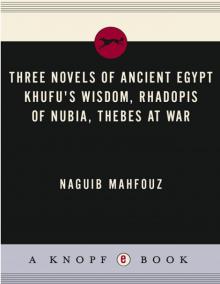 Three Novels of Ancient Egypt
Three Novels of Ancient Egypt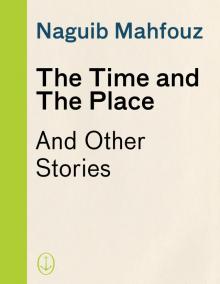 The Time and the Place
The Time and the Place Palace Walk tct-1
Palace Walk tct-1 Akhenaten
Akhenaten The Seventh Heaven
The Seventh Heaven The Thief and the Dogs
The Thief and the Dogs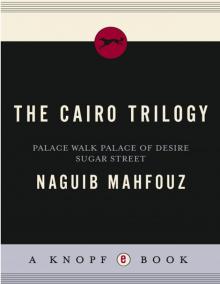 The Cairo Trilogy
The Cairo Trilogy Sugar Street tct-3
Sugar Street tct-3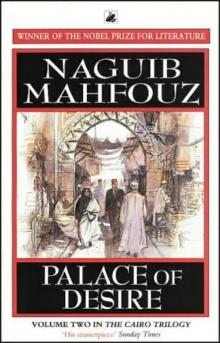 Palace of Desire tct-2
Palace of Desire tct-2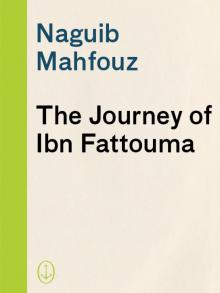 The Journey of Ibn Fattouma
The Journey of Ibn Fattouma